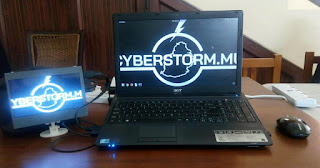Day - 0:
This is my second hackathon with cyberstorm.mu and we were already at the location where the team had gather, have intense code session and food feast. It is a tradition for us now to welcome new people in the group to participate.
Once we reached the villa at Pointe aux Piments, we started unpacked and as every geek guy we need to have out internet connection setup first. Unlike last time we had to take internet packages every 2hrs, we now have a good stable connection.
I got my workstation ready and getting ready to start the challenges.
Half of the day is already gone, we are now waiting for the food to come to have lunch and pizza is everyone`s favorite.
Then after lunch, we discussed what task we have and in which project we need to work.
I was assigned to add Pha (Post handshake authentication in wget) and I was working together with Rahul, he was adding the Pha in nagios-plugins.
More info on Pha.
Time went by very fast and it was already night while researching, debugging and compiling of wget.
Day - 1:
We woke up early, had a short breakfast and got to work again trying to compile a tool to do our testing (wireshark).
To ensure that our patch is really working we tested before and after modifying the code.
It was already lunchtime and we had nice fried noodles to eat. The day went by trying to compile the Wireshark.
After hours and hours of working, we finally got the test results we were looking for. so we both send our PR and wait for the code maintainers to reply.
Day - 2:
When we woke up we had a good breakfast again. When I checked my mail I got a reply by the maintainer and I was asked to refine the patch a bit more.
We were assigned to another project, Eclipse - Paho for TLS1.3 and Hitch for 0RTT. Another day, another compilation to do.
See you in the next blog.




















